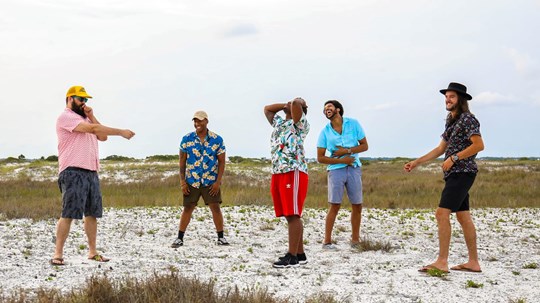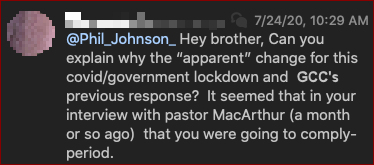Search Results for Don't
Links
Blessed Quietness Journal is a ministry of the Van Nattan family and their friends.
|
Old Fashioned Christian Music Radio
|
Articles
Videos
News
Christians can disciple each other toward action, prayer, and hope.
 I’m 26 and mostly full of enthusiasm for the future. But when I think about the heat waves, floods, and humanitarian crises that I’ll likely experience in my lifetime, I feel a sense of dread. And even more so when I think about the future of my children and my children’s children. I wonder if they’ll get to experience all the beauty of God’s creation that I so cherished while growing up.As a young farmer, I feel my chest tighten as I watch weather patterns and the seasons become more and more erratic. I worry if there’ll be wars for food and water with a warmer climate, or if water sources will be polluted and the soil will be eroded.Many people, especially my age, feel the same way. A recent survey asked 10,000 young people across the world about their thoughts and feelings regarding climate change. According to the findings, three out of four young people think the future is frightening. More than half reported feelings of sadness, anxiety, anger, and powerlessness when thinking about climate change. And around 45 percent of respondents said their feelings about climate change negatively affected their daily life and functioning.These fears have become so prevalent in our generation that a new term has been coined: eco-anxiety.In a way, young people today have fulfilled climate activist Greta Thunberg’s provocation to leaders at the World Economic Forum in Davos, Switzerland, in 2019: “I don't want you to be hopeful, I want you to panic. I want you to feel the fear I feel every day.”But while I respect Thunberg’s contribution to putting climate change on the world’s agenda, I disagree with her on this. I don’t believe that panic will help us. ...Continue reading... I’m 26 and mostly full of enthusiasm for the future. But when I think about the heat waves, floods, and humanitarian crises that I’ll likely experience in my lifetime, I feel a sense of dread. And even more so when I think about the future of my children and my children’s children. I wonder if they’ll get to experience all the beauty of God’s creation that I so cherished while growing up.As a young farmer, I feel my chest tighten as I watch weather patterns and the seasons become more and more erratic. I worry if there’ll be wars for food and water with a warmer climate, or if water sources will be polluted and the soil will be eroded.Many people, especially my age, feel the same way. A recent survey asked 10,000 young people across the world about their thoughts and feelings regarding climate change. According to the findings, three out of four young people think the future is frightening. More than half reported feelings of sadness, anxiety, anger, and powerlessness when thinking about climate change. And around 45 percent of respondents said their feelings about climate change negatively affected their daily life and functioning.These fears have become so prevalent in our generation that a new term has been coined: eco-anxiety.In a way, young people today have fulfilled climate activist Greta Thunberg’s provocation to leaders at the World Economic Forum in Davos, Switzerland, in 2019: “I don't want you to be hopeful, I want you to panic. I want you to feel the fear I feel every day.”But while I respect Thunberg’s contribution to putting climate change on the world’s agenda, I disagree with her on this. I don’t believe that panic will help us. ...Continue reading... |
A note from Dan PhillipsAfter about seven years without a post, I posted a copy of a letter I sent to the congregation I serve in Houston, Texas. I wanted to help parents talk with their children about the ubiquitous "Pride Month" intrusions. Then I followed up with a sermon. But someone flagged it to Blogger, where it was ruled that my post was "Hate Speech." Their definition: "content that promotes or condones violence against or has the primary purpose of inciting hatred against an individual or group on the basis of their …sexual orientation, gender, gender identity, or any other characteristic that is associated with systemic discrimination or marginalization." This, of a post that literally says "we don't hate people who want bad things…. We love people who don't know Jesus…" But today, to believe in the actual Jesus is to be called a "hater." You will find my letter posted elsewhere, unedited. Click HERE to read the post Blogger tried to censor.
  |
If you're not sure, don't post it. You'll never regret the joke you don't tell.
 (Photo: Justin humorously explains social distancing, but laughs so hard that he and Manuel forget not to touch their faces.)Humor is gift from God.Truly.The ability to laugh, even (especially?) during a crisis is an important way to find relief and share community.But knowing the line between what’s funny and what’s distasteful can be hard.So, are there any guidelines we can follow to help us share humor in a responsible way during the current season of difficulty?Here are a few pointers:1. Run it by someone else, firstBefore posting or re-posting something on social media, ask a trusted friend if you should.If they cringe, quarantine the joke between the two of you.2. Laugh with, not atThere’s enough dividing us. Use laughter to unite.Social distancing is for geography, not humor.3. Keep it light-hearted, not edgyWhile insult comedy is a valid form of communication, it’s hard to do well. It should be left to the professionals. Especially when people are ill or at risk.Default to the light-hearted, not the edgy.4. Use it to instructHumor has a way of cutting through people’s defenses so they can hear something they might otherwise be closed off to.For a great example of using humor to instruct during this crisis, check out the Don’t Be A Spreader video from Max and Mel Brooks.5. If you're not sure, don't post itYou’ll never regret the joke you don’t tell.Continue reading... (Photo: Justin humorously explains social distancing, but laughs so hard that he and Manuel forget not to touch their faces.)Humor is gift from God.Truly.The ability to laugh, even (especially?) during a crisis is an important way to find relief and share community.But knowing the line between what’s funny and what’s distasteful can be hard.So, are there any guidelines we can follow to help us share humor in a responsible way during the current season of difficulty?Here are a few pointers:1. Run it by someone else, firstBefore posting or re-posting something on social media, ask a trusted friend if you should.If they cringe, quarantine the joke between the two of you.2. Laugh with, not atThere’s enough dividing us. Use laughter to unite.Social distancing is for geography, not humor.3. Keep it light-hearted, not edgyWhile insult comedy is a valid form of communication, it’s hard to do well. It should be left to the professionals. Especially when people are ill or at risk.Default to the light-hearted, not the edgy.4. Use it to instructHumor has a way of cutting through people’s defenses so they can hear something they might otherwise be closed off to.For a great example of using humor to instruct during this crisis, check out the Don’t Be A Spreader video from Max and Mel Brooks.5. If you're not sure, don't post itYou’ll never regret the joke you don’t tell.Continue reading... |
by Phil Johnson
  e regard the wearing of masks in worship first of all as a matter of conscience—and since we are forbidden by the teaching of Christ not to make extrabiblical religious rules that bind men's consciences (Matthew 23:1-7; 15:1-9), we neither mandate nor forbid the wearing of masks in worship. e regard the wearing of masks in worship first of all as a matter of conscience—and since we are forbidden by the teaching of Christ not to make extrabiblical religious rules that bind men's consciences (Matthew 23:1-7; 15:1-9), we neither mandate nor forbid the wearing of masks in worship. Veils and face coverings have profound religious significance in many world religions. Indeed, much of the rhetoric surrounding COVID masks (even among evangelical Christians) describes them as symbols of personal piety. Serious questions about the usefulness, effectiveness, or medical necessity of masks are routinely dismissed or swept aside, and people are told to wear them simply because they are a tangible, visible means of showing love for one's neighbor. This rationale is pressed on people's consciences regardless of whether it can be proved statistically that they really safeguard anyone from the virus, and irrespective of the fact that masks can cause other medical problems. But COVID masks have become, in effect, secularism's substitute for religious vestments. No one can reasonably deny that face coverings have become the chief symbol of popular culture's sanctimonious devotion to the secularist credo.But one of the distinctives of Christian worship is face-to-face fellowship. Koinonia is the Greek expression the New Testament uses to describe it. The word conveys the idea of community, close association, and intimate social contact. Thus the apostle's instructions: "Greet one another with a holy kiss" are repeated four times in the Pauline epistles (Romans 16:16; 1 Corinthians 16:20; 2 Corinthians 13:12; 1 Thessalonians 5:22).The importance of face-to-face koinonia is stressed repeatedly. Paul writes, "We . . . were all the more eager with great desire to see your face" (1 Thessalonians 2:17). "We night and day keep praying most earnestly that we may see your face" (3:10). The apostle John writes, "I hope to come to you and speak face to face, so that your joy may be made full" (2 John 12). "I hope to see you shortly, and we will speak face to face" (3 John 14).Worship, in particular, is best seen as an open-face discipline. Covering the face is a symbol of disgrace or shame (Jeremiah 51:51; Job 40:4). Concealing one's mouth while praising God suppresses the visible expression of worship. The Psalms' calls to worship are filled with the words "tongue," "lips," and "mouth." "Sing aloud unto God our strength: make a joyful noise" (Psalm 81:1). " Wholehearted worship cannot be sung as intended—unrestrained and unmuted—from behind a state-mandated face covering. We see "the Light of the knowledge of the glory of God in the face of Christ" (4:6), and our faces were designed by him to reflect that glory back to heaven in uninhibited praise.It is true, of course, that for now, "We see in a mirror dimly, but [someday] face to face" (1 Corinthians 13:2). That speaks of a face-to-face encounter with Christ himself, when we will be brought into the fullness of knowledge and moral perfection. John the apostle says, "We know that when He appears, we will be like Him, because we will see Him just as He is" (1 John 3:2).Despite the temporary limitation of seeing heaven's glory as if we were looking in a dim mirror, we nevertheless are privileged as Christians to have a view of divine glory that is superior to what Moses and the Israelites enjoyed at Sinai. We see God's glory revealed in Christ—"glory as of the only begotten from the Father, full of grace and truth" (John 1:14). Unlike Moses, who was shielded in the cleft of a rock from seeing the full display of divine glory; and unlike the Israelites, who only saw the fading reflection of glory on Moses' face (and even that was covered with a veil) we see Christ so clearly revealed that it is as if we are looking in the very face of God's glory. "We all, with unveiled face, beholding as in a mirror the glory of the Lord, are being transformed into the same image from glory to glory" (2 Corinthians 3:18). Again: we see "the glory of God in the face of Christ" (4:6).Yes, the language of that biblical passage is symbolic. We don't literally see the face of Christ physically. For now, we see him as he is revealed on the pages of the New Testament. But the symbolism embodied in Paul's description of seeing him with "unveiled face" is important, and the wearing of masks—especially government-mandated masks that serve as the vestments of secular religion—feels like a covert attempt to erase one of the core truths that makes Christianity unique.Those are my personal convictions about masks. It's not a dogma we teach. It's certainly not a rule we expect people in the church to swear fidelity to. Again, we don't want to bind anyone's conscience with manmade restrictions. We especially do not want to shame the person who wears a mask purely because he or she genuinely believes the current orthodoxy about masks as an effective shield against viral transmission. People in the church are free to wear masks if they choose. But people who share the above view are likewise free to worship, sing, pray, and proclaim God's Word without a face covering—even if that goes against the vacillating, sometimes arbitrary, and frequently heavy-handed dictates of government officials. It is simply not the church's duty to enforce executive orders based on a politician's whimsy—particularly when those edicts impinge on our freedom of worship. Veils and face coverings have profound religious significance in many world religions. Indeed, much of the rhetoric surrounding COVID masks (even among evangelical Christians) describes them as symbols of personal piety. Serious questions about the usefulness, effectiveness, or medical necessity of masks are routinely dismissed or swept aside, and people are told to wear them simply because they are a tangible, visible means of showing love for one's neighbor. This rationale is pressed on people's consciences regardless of whether it can be proved statistically that they really safeguard anyone from the virus, and irrespective of the fact that masks can cause other medical problems. But COVID masks have become, in effect, secularism's substitute for religious vestments. No one can reasonably deny that face coverings have become the chief symbol of popular culture's sanctimonious devotion to the secularist credo.But one of the distinctives of Christian worship is face-to-face fellowship. Koinonia is the Greek expression the New Testament uses to describe it. The word conveys the idea of community, close association, and intimate social contact. Thus the apostle's instructions: "Greet one another with a holy kiss" are repeated four times in the Pauline epistles (Romans 16:16; 1 Corinthians 16:20; 2 Corinthians 13:12; 1 Thessalonians 5:22).The importance of face-to-face koinonia is stressed repeatedly. Paul writes, "We . . . were all the more eager with great desire to see your face" (1 Thessalonians 2:17). "We night and day keep praying most earnestly that we may see your face" (3:10). The apostle John writes, "I hope to come to you and speak face to face, so that your joy may be made full" (2 John 12). "I hope to see you shortly, and we will speak face to face" (3 John 14).Worship, in particular, is best seen as an open-face discipline. Covering the face is a symbol of disgrace or shame (Jeremiah 51:51; Job 40:4). Concealing one's mouth while praising God suppresses the visible expression of worship. The Psalms' calls to worship are filled with the words "tongue," "lips," and "mouth." "Sing aloud unto God our strength: make a joyful noise" (Psalm 81:1). " Wholehearted worship cannot be sung as intended—unrestrained and unmuted—from behind a state-mandated face covering. We see "the Light of the knowledge of the glory of God in the face of Christ" (4:6), and our faces were designed by him to reflect that glory back to heaven in uninhibited praise.It is true, of course, that for now, "We see in a mirror dimly, but [someday] face to face" (1 Corinthians 13:2). That speaks of a face-to-face encounter with Christ himself, when we will be brought into the fullness of knowledge and moral perfection. John the apostle says, "We know that when He appears, we will be like Him, because we will see Him just as He is" (1 John 3:2).Despite the temporary limitation of seeing heaven's glory as if we were looking in a dim mirror, we nevertheless are privileged as Christians to have a view of divine glory that is superior to what Moses and the Israelites enjoyed at Sinai. We see God's glory revealed in Christ—"glory as of the only begotten from the Father, full of grace and truth" (John 1:14). Unlike Moses, who was shielded in the cleft of a rock from seeing the full display of divine glory; and unlike the Israelites, who only saw the fading reflection of glory on Moses' face (and even that was covered with a veil) we see Christ so clearly revealed that it is as if we are looking in the very face of God's glory. "We all, with unveiled face, beholding as in a mirror the glory of the Lord, are being transformed into the same image from glory to glory" (2 Corinthians 3:18). Again: we see "the glory of God in the face of Christ" (4:6).Yes, the language of that biblical passage is symbolic. We don't literally see the face of Christ physically. For now, we see him as he is revealed on the pages of the New Testament. But the symbolism embodied in Paul's description of seeing him with "unveiled face" is important, and the wearing of masks—especially government-mandated masks that serve as the vestments of secular religion—feels like a covert attempt to erase one of the core truths that makes Christianity unique.Those are my personal convictions about masks. It's not a dogma we teach. It's certainly not a rule we expect people in the church to swear fidelity to. Again, we don't want to bind anyone's conscience with manmade restrictions. We especially do not want to shame the person who wears a mask purely because he or she genuinely believes the current orthodoxy about masks as an effective shield against viral transmission. People in the church are free to wear masks if they choose. But people who share the above view are likewise free to worship, sing, pray, and proclaim God's Word without a face covering—even if that goes against the vacillating, sometimes arbitrary, and frequently heavy-handed dictates of government officials. It is simply not the church's duty to enforce executive orders based on a politician's whimsy—particularly when those edicts impinge on our freedom of worship. |
by Phil Johnson
  ot this question today in more than one Tweet (regarding the Grace Church elders' statement "Christ, Not Caesar, Is Head of the Church"), so I'll answer it here: ot this question today in more than one Tweet (regarding the Grace Church elders' statement "Christ, Not Caesar, Is Head of the Church"), so I'll answer it here: Thanks for the question. I'll answer candidly. Speaking for myself alone, I'll acknowledge that yes, my thinking on the question of the COVID-19 quarantine and Romans 13 has changed somewhat—or at least been refined, illuminated, qualified, and enriched. I've been forced by circumstances to rethink and amplify my answers carefully because of the government's relentless attempts to keep churches closed despite the fact that months have passed without the apocalyptic quotas of death and disease that were originally predicted. My original concern about the virus was clearly overblown. At the time, I needed to be cautious, because we could not possibly know how serious the threat really was. My concern now is for people whose need for fellowship and pastoral care is going unmet. I do have firsthand knowledge of how critical this emergency is.In the weeks since March several things happened that affect my perspective. For one thing, the California Governor's edicts have become increasingly onerous.He has told churches they should not have congregational singing.He wants to limit church attendance to 100 (even in a massive 3,000-seat auditorium).He says churches are "nonessential" while insisting that marijuana dispensaries, liquor stores, and casinos are vital businesses that must be kept open.Although he briefly showed signs of backing off the policy of church closures, he then immediately doubled down to try to force the mandatory re-closure of all places of worship "indefinitely" (even though there's no evidence churches have been hotspots for passing the virus).Meanwhile, government officials have not only permitted but actively encouraged mass demonstrations (including riots) for political causes.With all of that going on, I was forced to rethink my position on Romans 13. The elders of our church also realized the need for us to answer in greater detail the question of who has the authority to govern the doctrine, worship, and polity of the church. The elders' statement that was affirmed on July 23 and made public the following day is the result. It's a clarification and qualification of everything we have previously said about the duty imposed on us by Romans 13 and 1 Peter 2. Without denying that duty, we're endeavoring to explain biblically why those passages don't call for blind, automatic acquiescence to government overreach into church business.It is of course still the case that in a real and impending health crisis, the elders and pastors of a church may wisely decide to follow the recommendations of health officials with regard to protecting against dangerous contagions. That's precisely what we did at the start of the quarantine. Circumstances have changed, however, and we have adapted (and explained) our response accordingly.An observant person who has been following me might have noticed subtle shifts in my position since the quarantine began. I knew from the start that things might change if politicians began to use the health crisis in an opportunistic way. When explaining our position on Romans 13 several weeks ago, I wrote this: How long until the government-ordered quarantine is undeniably excessive, or we conclude that it's targeted persecution against our worship and therefore an illegal attempt to make us disobey Hebrews 10:25? That time may come, and when it does, we may have to implement the principle of Acts 5:29. The question of whether we have already passed that point is another subjective issue Thanks for the question. I'll answer candidly. Speaking for myself alone, I'll acknowledge that yes, my thinking on the question of the COVID-19 quarantine and Romans 13 has changed somewhat—or at least been refined, illuminated, qualified, and enriched. I've been forced by circumstances to rethink and amplify my answers carefully because of the government's relentless attempts to keep churches closed despite the fact that months have passed without the apocalyptic quotas of death and disease that were originally predicted. My original concern about the virus was clearly overblown. At the time, I needed to be cautious, because we could not possibly know how serious the threat really was. My concern now is for people whose need for fellowship and pastoral care is going unmet. I do have firsthand knowledge of how critical this emergency is.In the weeks since March several things happened that affect my perspective. For one thing, the California Governor's edicts have become increasingly onerous.He has told churches they should not have congregational singing.He wants to limit church attendance to 100 (even in a massive 3,000-seat auditorium).He says churches are "nonessential" while insisting that marijuana dispensaries, liquor stores, and casinos are vital businesses that must be kept open.Although he briefly showed signs of backing off the policy of church closures, he then immediately doubled down to try to force the mandatory re-closure of all places of worship "indefinitely" (even though there's no evidence churches have been hotspots for passing the virus).Meanwhile, government officials have not only permitted but actively encouraged mass demonstrations (including riots) for political causes.With all of that going on, I was forced to rethink my position on Romans 13. The elders of our church also realized the need for us to answer in greater detail the question of who has the authority to govern the doctrine, worship, and polity of the church. The elders' statement that was affirmed on July 23 and made public the following day is the result. It's a clarification and qualification of everything we have previously said about the duty imposed on us by Romans 13 and 1 Peter 2. Without denying that duty, we're endeavoring to explain biblically why those passages don't call for blind, automatic acquiescence to government overreach into church business.It is of course still the case that in a real and impending health crisis, the elders and pastors of a church may wisely decide to follow the recommendations of health officials with regard to protecting against dangerous contagions. That's precisely what we did at the start of the quarantine. Circumstances have changed, however, and we have adapted (and explained) our response accordingly.An observant person who has been following me might have noticed subtle shifts in my position since the quarantine began. I knew from the start that things might change if politicians began to use the health crisis in an opportunistic way. When explaining our position on Romans 13 several weeks ago, I wrote this: How long until the government-ordered quarantine is undeniably excessive, or we conclude that it's targeted persecution against our worship and therefore an illegal attempt to make us disobey Hebrews 10:25? That time may come, and when it does, we may have to implement the principle of Acts 5:29. The question of whether we have already passed that point is another subjective issue |



 Links
Links  Articles
Articles  Blogs
Blogs  Videos
Videos  News
News  Colors
Colors 

 New links
New links











